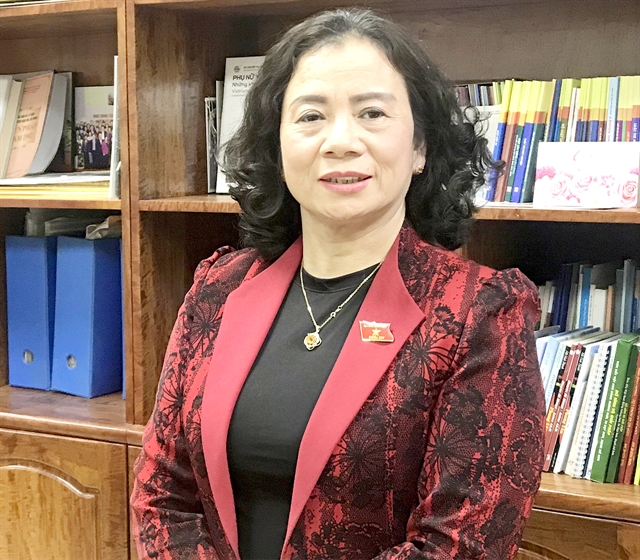 Opinion
Opinion


|
| Vice chairwoman of the National Assembly’s Committee for Social Affairs Lê Thị Nguyệt. Photo quochoi.vn |
Vice chairwoman of the National Assembly’s Committee for Social Affairs Lê Thị Nguyệt told National Assembly’ portal quochoi.vn about the need to further improve the legal framework on domestic violence prevention and control to better facilitate law enforcement.
Can you give a brief about domestic violence, particularly child abuse in Việt Nam?
In 2019 and 2020, Việt Nam’s National Assembly conducted a supervisory programme on the implementation of policies and regulations relating to child abuse prevention and control. It was reported that between January 1, 2015, and June 30, 2019, as many as 8,442 child abuse cases involving 8,709 children were detected and cracked down. Of the child victims, 1,672 are boys and 7,037 are girls. As many as 6,431 children or 73.85 per cent of the victims were sex abuse cases. As many as 191 children were killed, 666 were injured while 106 children were reportedly smuggled and trafficked.
More than 1,300 children were victims of other types of child abuse including maltreatment, using persons under the age of 16 for child pornography; swapping children under one year old; seducing, forcing or harbouring children who violated laws or offering depraved cultural products to children.
During the period from 2015 to middle of 2019, sexual abuse against children is the most concerning issue. In some localities, child sexual abuse accounted for more than 90 per cent of total child abuse cases.
Many cases were not detected and stopped quickly, especially cases which happened in isolated remote areas, at homes of the child victims or parents of the victims knew about the abuse but did not report to authorities.
In cases, offenders made use of social networks and internet, using fake names and addresses, which caused difficulties for authorised agencies to identify, detect and punish them. Underage marriage – a custom of some ethnic groups is also a cause of child abuse cases.
In Việt Nam, families believe that spare the rod, spoil the children. What do you think about such a point of view? Do you think that view an excuse for domestic violence?
I think that it is necessary to understand the saying with has a wide meaning. Whenever parents use a rod to educate their children, they should explain to the children why they do so. The children also need to understand the adults’ actions so they could aware of the care, the love and the expectations that their parents count on them. Without proper understanding, some adults use the rod all the time to punish their children when they make mistakes. It’s a crime, not a way of education which former generations' implied.
In general, domestic violence is rooted from improper awareness on gender equality with the gender prejudice in which, boys and men are appreciated while girls and women are looked down upon. The prejudice make men bossy, they allowed themselves to abuse women while the women usually suffer the violence in silence. In many cases, the women victims are afraid that if they speak out about domestic violence, their families would be laughed at. Such thinking also leaves negative impacts on the children in such families, so they are likely to take such domestic violence for granted.
The overuse of alcoholic drinks and narcotics, improper law communication and enforcement as well as poor legal understanding are also major causes for domestic violence in Việt Nam.
Nowadays, children are more vulnerable to abuse, particularly in the cyber world when they access the internet and face its negative impacts. Meanwhile, localities nationwide face the shortage of facilities for children to play, study and develop healthily and safely. In many families, parents fail to offer proper care and attention to their children because they have to struggle to make ends meet or in other cases, they rush to earn money rather than spend time taking care of their children.
What have Việt Nam’s National Assembly and Government done to tackle those problems?
Việt Nam has paid great attention to domestic violence prevention and control. In 1982, the country ratified the United Nations’ Convention on the Elimination of all Forms of Discrimination against Women (CEDAW). It also passed legal documents including Constitution, Criminal Code, Civil Code, Law on Marriage and Family, Law on Gender Equality to regulate issues relating to domestic violence.
On November 21, 2007, Việt Nam’s National Assembly passed Law on Domestic Violence Prevention and Control to create a legal foundation to protect rights and benefits of members of the family, helping to reinforce and nurture Vietnamese homes in which every member could live and develop healthily, equally, happily and safely.
The law is also a legal tool to protect victims of domestic violence. The Government of Việt Nam, ministries and agencies issued eight decrees, two resolutions, two directives, 11 decisions and 19 circulars to instruct implementing the law.
Notably, on February 6, 2014, the Prime Minister approved a national programme on domestic violence prevention and control, aiming to create milestones in improving public awareness and delivering stronger actions to curb and prevent domestic violence.
So, in terms of the legal framework, Việt Nam has had a quite completed one but of course, it would still require changes to adapt to new situations. The Government reviewed the implementation of the law and planned to propose the National Assembly some amendments to the law so that relevant problems could be addressed more effectively.
How should families change their education methods to minimise domestic violence?
I think that there is no common model for education in the family. We have improved the legal framework and identified responsibilities of authorised agencies, so it’s time for families and individuals to clarify their responsibilities and obligations.
Now, people are still unclear about domestic violence and it seems that only physical abuse is noticed.
Many people believe that a slap or an angry curse to another is not wrong nor does it violate laws. If a child is naughty, parents will use rod to punish as a way of education or the wife has to satisfy the husband's sexual needs. They don’t think such actions are domestic violence. They think the actions are as normal as meals, considering the actions are their private business that every family can have.
Even many victims themselves do not want to report the violence because they are afraid of affecting their fame and family's honour, so they often hide it. The chain of friendship and personal dignity has obscured the legal provisions, making it not easy to enforce even though there are regulations. Without creating a good environment for laws to spread and adjust behaviour in family life, we could not effectively prevent and curb domestic violence.
Joint efforts of authorities, families, individuals and the community are needed to tackle domestic violence.
First, we need to boost communication about the law on domestic violence prevention and control, law on gender equality to improve public awareness and change people’s behaviours to domestic violence.
Second, the National Assembly and deputies continue to supervise law enforcement as well as review and amend laws to better address arising problems.
Last, it is necessary to develop a State management model in which issues of population, gender equality, family, children are combined closely. Intersectoral co-operation should be further promoted to address domestic violence. VNS




